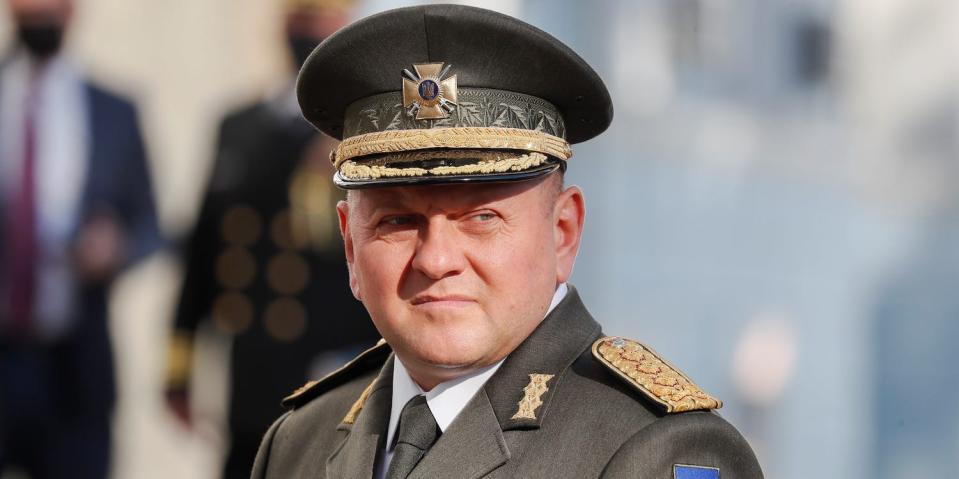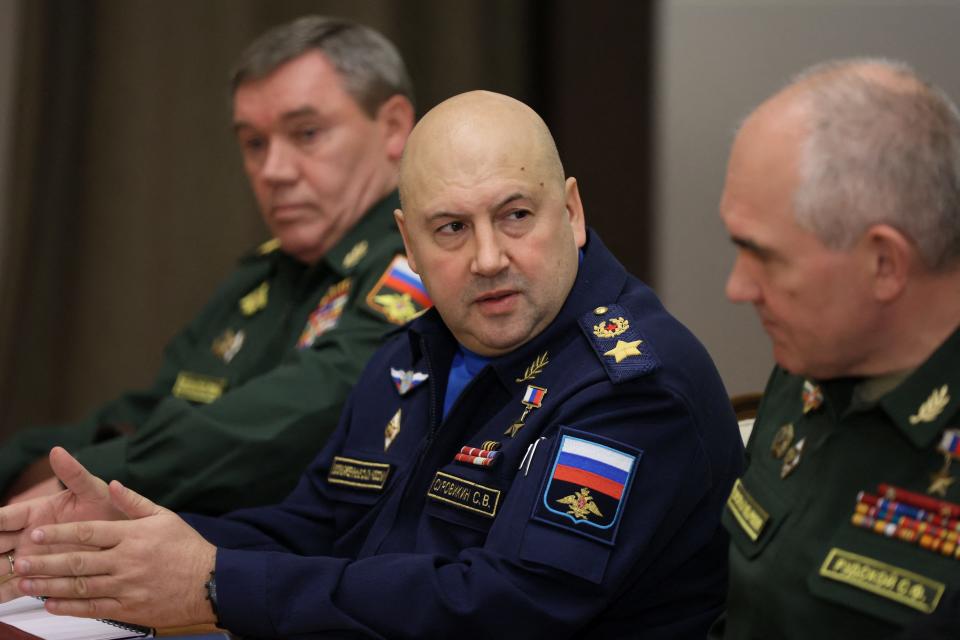Ukraine's 'Iron General' is facing off against his 4th Russian war commander. Here's why the others lost their jobs.

Valerii Zaluzhnyi, commander-in-chief of Ukraine's Armed Forces, has led the military since 2021.
He is currently squaring off against Russian Gen. Valery Gerasimov.
Gerasimov is Moscow's fourth commander since Russia invaded. Here's what happened to the other three.
Russia's full-scale war in Ukraine can be measured in time, 15 months for a war it thought it could win in days; in casualties, hundreds of thousands since the war began; or in the invading army's limited territorial gains as the bodies pile up.
It can also be measured in the number of times Russia has changed commanders as Moscow looks for someone who can win this fight. The Kremlin is on it's fourth commander since the February 2022 invasion. Ukraine, on the other hand, has only had one: Valerii Zaluzhnyi, the commander-in-chief of Ukraine's Armed Forces.
Zaluzhnyi, also known as Ukraine's "Iron General," has led Kyiv's military since July 2021, when he was appointed to the role by Ukrainian President Volodymyr Zelenskyy. Zaluzhnyi made it his mission to further reform Ukraine's armed forces to operate as Western militaries do, backing away from older Soviet-era practices.
Zaluzhnyi has studied closely his current opponent, Russian Gen. Valery Gerasimov, who was tapped to lead Moscow's campaign in January after previously serving as the longtime chief of the general staff of the country's armed forces.
"I learned from Gerasimov. I read everything he ever wrote," Zaluzhnyi previously told Time Magazine in an interview last year. "He is the smartest of men, and my expectations of him were enormous."
The Russian general, however, does not appear to be living up to those expectations. Gerasimov oversaw a relatively lackluster Russian winter offensive, during which his forces failed to seize a significant amount of territory and suffered tens of thousands of casualties in the process.
The two men are squaring off as Ukraine gears up for a highly anticipated counteroffensive aimed at liberating occupied areas in the country's eastern and southern regions. Aside from trying to prevent Ukraine from conducting successful advances, Gerasimov will also attempt to do something that none of his predecessors have been able to do since the war started — keep his job for more than five months.
Here's what happened to Russia's previous three war commanders, according to a recent analysis by the Institute for the Study of War (ISW), a Washington-based think tank that has closely tracked developments in Ukraine.
Alexander Dvornikov
When Russia first launched its full-scale invasion of Ukraine in late-February 2022, it relied on district commanders rather than overall commander of the war effort. What followed was several weeks of poorly coordinated operations, Russian missteps, and failures that ultimately led to Moscow's forces withdrawing from the Kyiv region and repositioning themselves to focus on Ukraine's eastern Donbas region.
Russian President Vladimir Putin's "reluctance to appoint an overall theater commander for his invasion of Ukraine has had cascading effects on the Russian military including fueling intense factionalization, disorganizing command structures, and feeding unattainable expectations," ISW said.

In early April, after these initial failures in a war that Russia thought it could and was expected to win in days, Putin appointed Army Gen. Alexander Dvornikov to be Moscow's first overall theater commander and reportedly instructed him to seize the Donbas region by the beginning of May and establish one uniform command for Moscow's operations in Ukraine. Dvornikov also served as the southern military district commander.
Gennady Zhidko
Dvornikov's leadership ended after nearly two months following failures to secure either goal. He was replaced by Army Gen. Gennady Zhidko, who also served as the eastern military district commander.
"The dual roles given Zhidko and Dvornikov were likely a result of Putin's continued reluctance to make any single general too prominent," ISW said.
Just as Dvornikov's appointment is a bit of a mystery, the reasons Putin appointed Zhidko are unclear, but it's possible the relationship these men had with Gerasimov, who was still chief of the general staff at the time, played a role. Like Dvornikov, Zhidko was instructed to formalize command structures.
Zhidko's tenure lasted through the summer, when Russia enjoyed some successful offensive operations in eastern Ukraine before they were derailed. Russian territorial gains were short-lived as Ukraine launched a lightning-fast counteroffensive in the northeastern Kharkiv region in September, which saw Kyiv's forces liberate a chunk of occupied territory.
Ukrainian offensive operations were also carried out in the southern city of Kherson, which was later liberated to deprive Russia of an early war win.
Putin booted Zhidko from both of his roles in early October, ending a command that lasted a little over four months.
"The failure of two generals who were establishment MoD figures and Gerasimov affiliates likely solidified Putin's decision to appoint a commander not affiliated with Gerasimov to the position of overall theater commander after the Kharkiv debacle," ISW wrote.
Sergey Surovikin
In early October, Putin appointed Army Gen. Sergey Surovikin, nicknamed "General Armageddon," to be the overall theater commander. The move was likely aimed at appeasing Russia's pro-war ultranationalist community, according to ISW. This community often criticizes Russian failures in Ukraine but is fervently behind the war.
"Putin likely viewed Surovikin as the last untarnished high-ranking commander in Ukraine he could appoint to overall theater command," the think tank said. Surovikin's time in charge was shorter than Zhidko's but longer than Dvornikov's — lasting about three months.
There were several significant aspects of the conflict that occurred during his tenure as the top commander. These included the start of a widespread campaign of missile and drone attacks on Ukraine's critical infrastructure, Russia's retreat from Kherson city, and the expanding influence of the Wagner Group paramilitary organization and its founder Yevgeny Prigozhin.

Toward the end of 2022, Gerasimov had begun lobbying for his camp of leaders to secure more influence over the war in Ukraine by attempting to discredit Wagner's operations. As 2023 rolled around, and Russian forces continued to suffer heavy losses in eastern Ukraine, Putin seemingly gave in to Gerasimov's campaigning.
Russia's defense ministry announced in mid-January that Surovikin would be replaced by Gerasimov and demoted to deputy commander of Russia's military in Ukraine.
"The highly attritional capture of Soledar in January likely prompted Putin to acquiesce to Gerasimov's campaigning and appoint Gerasimov as the overall theater commander for the winter-spring offensive operation," ISW said. The capture of Soledar at high cost came as part of the brutal battle for Bakhmut, which Russia recently claimed to have taken, also at tremendous costs in terms of manpower and resources.
Western arms, including main battle tanks and armored vehicles, are currently flowing into Ukraine amid preparations for another Ukrainian counteroffensive push. For months, the Russians have been digging in and preparing a defense-in-depth strategy aimed at blunting the expected offensive. Though Putin's decision-making process is murky, there's a possibility the outcome of the coming fight could weigh heavily on Gerasimov's future as commander.
It's like White House National Security Council spokesman John Kirby mockingly said in February, Putin changes "generals the way I change socks."
Read the original article on Business Insider

 Yahoo Sports
Yahoo Sports 